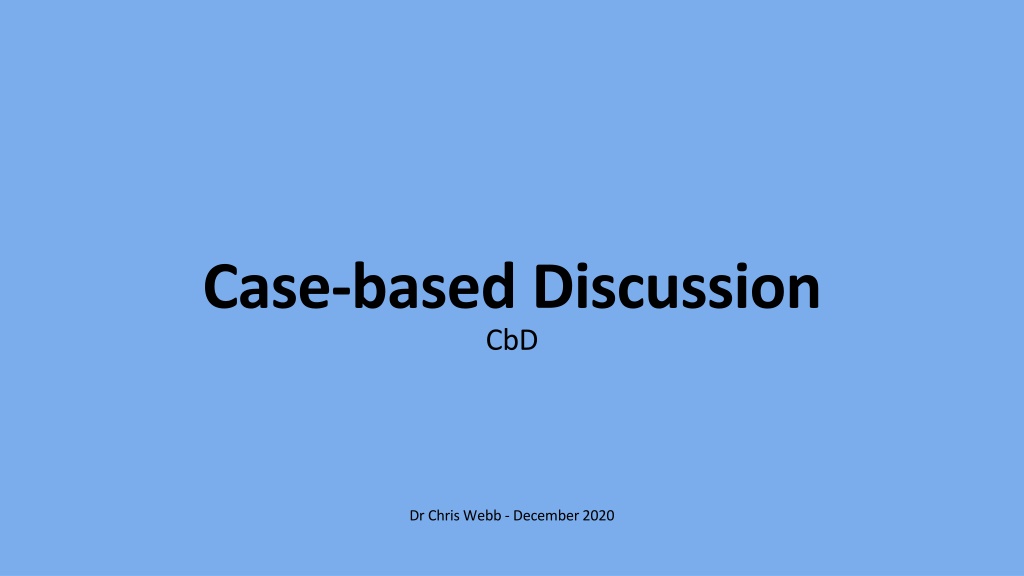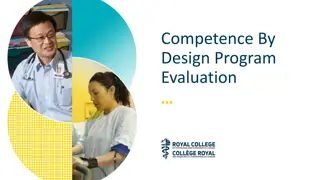Understanding Case-Based Discussions (CbD) in Medical Training
Case-based Discussions (CbDs) are structured oral interviews designed to evaluate a trainee's professional judgment in clinical cases. They assess decision-making, medical knowledge application, ethics, and the ability to handle complexity and uncertainty. Trainees are expected to complete a specific number of CbDs each year and cover a range of capabilities and clinical experience groups. Linking capabilities and clinical experience groups ensures meaningful feedback and reflection.
Download Presentation

Please find below an Image/Link to download the presentation.
The content on the website is provided AS IS for your information and personal use only. It may not be sold, licensed, or shared on other websites without obtaining consent from the author. Download presentation by click this link. If you encounter any issues during the download, it is possible that the publisher has removed the file from their server.
E N D
Presentation Transcript
Case-based Discussion CbD Dr Chris Webb - December 2020
What is a CbD? Structured oral interview designed to assess professional judgment in a clinical case Assessment assesses performance against Capabilities and looks at how the trainee made holistic, balanced and justifiable decisions in relation to patient care Assesses understanding and application of medical knowledge, ethical frameworks, ability to prioritise and how the trainee recognised and approached the complexity and uncertainty of the consultation
Number of CbDs required ST1/2 years are expected to only do CbDs Trainees are expected to complete 4 CbDs in each training year (2 in each 6-month period for a full time trainee)
CbDs and Capabilities Ideally CbDs will cover full range of the capabilities providing triangulation of grades for each capability across a of range of different assessment methods It is expected that all capabilities will have been assessed using a formal assessment tool at least once in 3-year training period but not all need to be done within a CbD Trainee prepares up to 3 capability areas they wish to discuss with their supervisor, prior to the CbD
CbDs and Clinical Experience Groups Expectation is that CbDs cover the range of Clinical Experience Groups While not mandatory to have a CbD for each Clinical Experience Group, a range of types of assessment and information will need to be provided in the Portfolio to show exposure to, learning from, and competence in caring for, the range of Clinical Experience Groups across each training year All Clinical Experience Groups should be covered by the range of assessments completed
Linking Capabilities and Clinical Experience Groups It is expected that a maximum of 3 capabilities and 2 Clinical Experience Groups are linked to each CbD so that in-depth reflection and meaningful feedback is given for each Separate assessments can be used if the assessment covers a larger number of either
When should the CbDs be done? It is expected that the assessments will be spread over time to demonstrate that the trainee is progressing The number of assessments stated are a minimum and if they are not demonstrating the grade expected for their level of training, additional assessments should be completed
How long should a CbD take? Depends on the complexity of the case CbD usually takes between 20- 30 minutes Time for each assessment will depend on content and discussion the trainee has with their supervisor
Preparation in advance The trainee: Selects a case for discussion States which Capabilities they feel they can demonstrate with the case Prepares a short summary of case Prepares to discuss how they handled the case and how they met the Capability descriptors The supervisor/trainer: Reviews case the trainee has suggested along with the medical notes Checks it is suitable for the Capabilities suggested and of a sufficient complexity Prepare questions to test the Capability areas and explore what the trainee actually did in that case Reviews the Capability descriptors and suggests questions to become familiar with what the trainee needs to demonstrate for the various grades
Case complexity It is expected that the trainee will be assessed in a range of cases that cover varying complexities They should be asked to bring more complex cases if all those they bring are of low challenge
Suggested protocol Trainee briefly describes the case Supervisor asks which Capabilities the trainee wishes to discuss first Supervisor questions the trainee in a way that allows them to demonstrate the highest level they can, based on the Capability descriptors Questioning continues with the supervisor postponing any questions from the trainee until the feedback section Each Capability of the 3-4 to be addressed is discussed with time for the trainee to add anything else they wish Both refer to the Capability descriptors. It is good practice for both the supervisor and trainee to consider these during the discussion Once the case and Capabilities have been fully discussed the supervisor moves to the feedback section It can be helpful to get the trainee to say which grade they feel they have demonstrated and to give their own feedback first The supervisor gives feedback on what was done well and demonstrated with grade decision followed by feedback for improvement, future different cases, and Capabilities that still need to be covered
LFTTs The numbers required are prorata for less than full-time trainees
Communication and Consultation Skills Communication with patients, the use of recognised consultation techniques, establishing patient partnership, managing challenging consultations, third-party consultations and the use of interpreters What questions did you ask to establish what the patient expected to achieve when coming to the GP practice. How did you separate these from what the patient thought about his or her health problems? Describe what you did or asked to balance the need to be focussed and keep to your appointment times with the need to allow patients to explain things in their way and feel heard How did you adapt your language or communication to suit this patient? [for example the patient might have communication difficulties, have learning difficulties, be working in a second language, or be a child] Give examples of things that you said Describe how you used the patient s health understanding to adapt your language and explanations Describe how you adjusted your medically safe plans to suit the patient s agenda and desire for inclusion in decision making How did you adjust your consultation to suit this patient given their background (educational and cultural) and beliefs (health and religious)? Describe how you used communication techniques or materials to improve patient understanding
Practising holistically Physical, psychological, socio-economic and cultural dimensions; patient s feelings and thoughts What was the patient s agenda (ideas, concerns and expectations)? How did you elicit their agenda? Why did they present now? What feelings did you explore? Did you identify any ongoing problems which might have affected this particular complaint? What effect did the symptoms have on the patient s work, family or carers and other parts of their life? (i.e. consider the difference between illness and disease) How did the symptoms affect him/her psychosocially? What phrases did you use to elicit these? What did you discover about the patient s culture and background? How did you use this to help advise the patient and their family about the next steps in their care? Did you explore the impact it had on other family members, carers or close friends? What did you find? How did you support them? What other teams or organisations have become involved in this person s care? How does this involvement link to the patient s needs? How have you involved the patient (and their carers or family?) in planning their own care? How did the patient feel about your choice of treatment? Did this influence your final decision? You have described a difference in health beliefs between you and the patient (or their carers / family). How did you address this difference whilst not losing the patient s trust?
Data gathering and interpretation Gathering and using data for clinical judgement, the choice of examination and investigations and their interpretation Tell me about the key findings in this case including duration of symptoms, their pattern or variability etc How did you focus on getting this information in the limited time available to you? How did you make sure that you gathered enough information to make sure the patient was safe? How did you exclude red flags? (E.g. How did you carry out a suicidal risk assessment?; How did you exclude a brain tumour?) Describe how you kept a balance between keeping focussed and excluding worrying things? (for you and for the patient?) How did you use pre-existing information (consultations, summary, letters, investigations) to help formulate your diagnosis/decision? Had you gathered any further information about this case from others? What bits of information from the history, examination and investigations did you find helpful in this case? Why? How did you elicit those? What examinations and/or investigations did you do? Explain why did you did all of these How did you interpret your findings from your examinations and/or investigations? How did you act on any abnormal or unexpected findings/results? I see from the notes that there is no reference to examining... their chest for example. Why is it not there? What prior knowledge of the patient did you have which affected the outcome of your consultation(s)? Tell me about the abnormalities that you have found examining this person and that you found on investigation. Tell me about which bit of the examination were most useful. Can you explain why this was? You have described how you gathered your data, how was this adapted for this particular patient?
Making diagnoses and decisions Conscious, structured approach to decision-making Tell me about the commonest causes locally of these symptoms? How does knowing this help you to care for this patient? What is the natural history/pattern of this condition? How does that fit with your findings and your plans for the next steps? What differential diagnoses did you consider? What features made each one more or less likely? You have suggested that the diagnosis might be x. Which bits of the history and examination made or make you wonder about other diagnoses? How did you come to your final working diagnosis? Remind me which bits of the history and examination were instrumental in this? When you got the result of the (names particular test) can you explain how it changed the diagnoses that you were considering? Did you use any tools, guidelines or frameworks to help you with making the diagnosis? (Which ones?) Your description of the diagnosis was not very clear, describe how you approached defining your next steps Tell me about how you used time to help you when making decisions here. What were your treatment options? Which did you choose? Why this one? Convince me that you made the right choice Did you consider any evidence in your final choice? Tell me about it How did you balance your treatment plan with the treatments requested or expected by the patient, their carers or family? Did you use any tools, guidelines or frameworks to help you with treatment decisions? You have described starting off on one treatment plan. What led to a change in your plan How close to the limits of your competence were you in managing this case? Primary care has clear national and local guidelines which are easily applied in clear situations. How did you use these when approaching this rather more confusing situation?
Clinical Management Recognition and management of common medical conditions You have described a patient with several different problems. How did you choose which of these to prioritise? How did this affect your final management plan? In what ways could this patient have been followed up. What were the advantages of using the way you have suggested? (What form of follow up did the patient suggest/ want, how did you incorporate this and keep the follow up plan safe?) What management options did you consider at the time? Tell me about some of the pros and cons of these options. Did the patient s preferences or situation affect the management plan? How? What made you prescribe x? How did you come to choosing that? What does the evidence say about it? Do you know how much that costs? Why not y which is cheaper and effective? What else is the patient on: did you check for interactions? You have described various medications that you have used. What non drug interventions did you suggest to manage this patient? Did you involve or make a referral to anyone else? What was the added value of involving this other team or person? (Considerations here might include use of resources, (including time) but also patient safety, and/or recognition of limits to personal recognition of medical conditions) What did you put in the referral letter? How did you use the practice computer system to communicate with others? (e.g. electronic referrals, messaging, email) Describe how you monitored the patient s progress. How did you ensure continuity of care? In what ways could this patient have been followed up? What were the advantages of using the way you have suggested? (What form of follow up did the patient suggest/ want, how did you incorporate this and keep the follow up plan safe?) Did you put in place any follow up/review? Why do you want to see them again? How did you decide if you or another doctor should review the patient?
Managing medical complexity Beyond managing straight-forward problems, eg managing co-morbidity, uncertainty & risk, approach to health rather than just illness What made this case medically complex? How did you resolve that? Were there any areas of uncertainty? What strategies did you use to manage that uncertainty? (e.g. using time) There was a lot to coordinate in this consultation from the acute to the chronic comorbidities. What strategies did you use to coordinate it all? The advantages and disadvantages of different options were complex here. How did you explain these to the patient? How do you know that this worked for them? In the course of your work with this family (carer or patient network) can you describe the areas where your medical training found it hard to adjust to their patient perceptions of what should be done. How did you manage these differences? What did you do to address this area? Was there a difference of agendas? How did you tackle this? Tell me exactly how you managed to merge agendas Tell me about how you managed the ongoing problems that added to the complexity of this case whilst also dealing with the immediate acute problems? How did you explain risk to the patient? Did you involve them in the risk management? To what extent and how? How did that risk affect your management plan? Did you use any health promotion strategies? How did you encourage the patient to e.g. stop smoking/lose weight/go back to work/other rehabilitation and recovery? Can you describe how this fitted into the rest of the discussions you had with this patient?
Organisation, Management and Leadership This is about understanding primary care s role in the NHS; how teams are managed and the development of clinical leadership skills Is the computer record entry satisfactory? Have any important negatives been left out? Have they captured the patient s narrative? Is it concise yet thorough? Did you use appropriate Read or SnoMed coding for diagnosis and treatment in line with local expectations or guidance? Was the consultation entry added in a timely manner? Describe how you balanced your need to record the consultation on the computer with the need to maintaining rapport with the patient How did you use the computer in the consultation (including previous consultations results, letters and on-line resources) What steps did you take to keep this consultation to time, whilst ensuring appropriate record keeping. Was the consultation entry added in a timely manner? How did you balance your need to record the consultation on the computer with the need to maintaining rapport with the patient? How effective and helpful is the future management plan they have written for their colleagues? What is the your suggestion on how to improve this? Did you use any online information or resources to help you? What? Why? How did this help? Describe the ways in which delegation and good time management improved your care of this patient Do you have any suggestions about how your management of this case would have been better if the guidance or organisation in the GP practice was different? What suggestions for change can you make based on this experience? How did the overall workload of the practice affect how you managed this patient?
Working with colleagues and in teams Working effectively for good patient care; sharing information with colleagues Did you involve anyone else in this case? Who? Why? How did they help? What skills did they bring that you don t have? (This may be especially relevant when involving Allied Health Professionals) Did you involve any other organisations/agencies in this case? For what purpose? Some of your colleagues will have been working with this patient before your involvement. How did this effect your role in the wider team caring for this patient? What information did you provide with your referral? How did you make sure that this was as useful as possible to the team you referred to? How did you ensure you had effective communication with others involved in this particular case? If many people/organisations are involved in the case, What do you see as your role considering so many others are already involved in this case? Do so many people need to be involved? Did you do anything to ensure coordination of the overall care to promote more effective team working? What steps did you take to ensure continuity of care? Can you describe what this case tells you about how our team works and the members interact?
Community orientation Management of health and social care of local community You have described the care you and this GP practice have given this patient; how would it be different in a neighbouring CCG area which has a different population? Can you tell me about the cost of investigation, treatment and/or referral/care here? How did you consider these when making your decisions? How have you have adjusted the care to fit the resources we have here? Tell me now about the implications of your treatment/investigations/referral on the individual patient and on society? Tell me more about these conflicting pressures How did you balance the needs of this patient against the needs of the whole local/patient population? What characteristics of our local community impact on this patient s care (epidemiological/social/economic/ethnic)? What local health resources are available that you encouraged the patient to access? (e.g. particular clinics that the hospital offers or weight loss/exercise classes) You have prescribed a range of different medications. Please tell me more about them concentrating on their costs and the evidence base for their use in this setting? Are there any limitations of local healthcare resources that impact on this patient s care? Did this case make you think of any greater social/health care changes/provision we need to consider for our local population? What would we need to do to make this happen?
Maintaining an ethical approach to practice Ethical practice, integrity, respect for diversity Given there is an ethical dimension to all cases (e.g. did you overload or starve the patient of information, involve them too much/little, spend too much time with them (to the loss of other patients) or spend too little): Tell me about the ethical aspects of his case? What were they? How did you manage them? Did any of your own values attitudes or ethics influence your behaviour this case? What particular professional codes of practice did you have to make sure you adhered to in this case? (e.g.in relation to Equality and Diversity issues or those who might perceive themselves as marginalised) Do you think you might have directly/indirectly discriminated and therefore judged this patient because of their x? If not how did you anticipate it making sure the patient didn t feel discriminated against?? What ethical principles did you use to inform your choice of treatment? How did you ensure the patient had an informed choice in terms of management? Was there a need to address confidentiality issues with the patient (e.g. in cases where the patient is a teenager)
Fitness to practice Awareness own performance, conduct or health, or of others; action taken to protect patients Was there any point in the consultation where you felt out of your depth? How did you define your limits? What did you then do? It sounds like this was quite an emotionally charged case. It may have caused some internal feelings. How did you manage or neutralise those to ensure they did not impact on the next patient you had to see? Our home or family life can change our behaviour and performance at work. Can you tell me about how your non work life might have affected you, when you were caring for this patient? Safety Netting: did you advise on when to come back? Why did you choose this time/ approach? (How did you ensure patient safety?) Did you use any tools to help with your safetynetting e.g. online resources? Chaperones: Did you use a chaperone? Tell me more about your decision on this. Was it for your benefit or theirs? (protecting patients, protecting doctors) How did you feel after you looked after this patient? How did you care for yourself? After the consultation, did you have any thoughts on your performance (include knowledge, skills and your approach to the patient)? Did you have any thoughts on how your performance could have been improved? What were these? Have you made any plans to tackle them? (PUNs and DENs) Were there any significant learning issues raised by this consultation? (including complaints). What were they? How did you proceed? Did you have any concerns over what one of the previous health care professionals had done? What did you do about it? Had you considered ringing your defence organisation for advice? (If relevant to the case) Why did you call them? What did you ask? What did they say?
CEPS Clinical examination and procedural skills Which examinations did you do in this case and why each one carried out? When you examined this patient, how did you assessed his or her x e.g. knee/ abdomen etc. What were you intending to gain from assessing x in this level of detail? Do you think that your assessment (examination) allowed you to make a definitive assessment; what further assessment might you have done? You have explained that you found x when you examined the (part of body). Tell me what this implies to you. What further examination did you do? What was the order of your examination (and your reason for this)? You have described doing x examination and then going on to do y. Was it your preference or the patient s? How did you manage the medico-legal aspects of your examination here? (considering informed consent, mental capacity, best interests etc) You have described doing an intimate examination. Tell me how you managed the patient s needs and care whilst also gaining the clinical information you needed Patients do not always want to have the examinations that a doctor might want to carry out. (How did you manage this difference?) Describe how you managed any cultural and ethical issues that arose in this case
